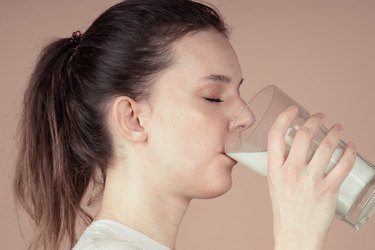
Soothing an upset stomach can be tricky. Eat or drink the wrong thing thinking it could help, and you could upset your stomach even more. With that in mind, you may have heard about drinking milk for upset stomach relief, but does it ease symptoms? The answer depends on why your stomach is aching.
Read more: Drinks That Help Stomach Aches
Video of the Day
Video of the Day
Milk for an Upset Stomach
How did milk come to be a solution for an upset stomach in the first place? Before antacids came on the market, people would drink milk to treat stomach pain, says Jesse P. Houghton, MD, the senior medical director of gastroenterology at Southern Ohio Medical Center in Portsmouth, Ohio.
However, they'd often drink so much milk that they developed a condition called "milk-alkali syndrome," Dr. Houghton says. Too much calcium in the body can cause a shift in the body's acid and base (alkali) balance, says the U.S. National Library of Medicine. Blood that becomes too much alkali, a condition called metabolic alkalosis, can lead to loss of kidney function, it says,
Milk can be both good and bad for an upset stomach, says Sara Cerrone, MD, a gastroenterologist with Peconic Bay Medical Group in Riverhead, New York. If it's an excess of acid in your stomach that's causing inflammation in the esophagus or stomach, then milk may help coat the acid, providing relief and soothing an upset stomach, she says.
However, drinking a glass of milk hoping it will relieve stomach pain could, in many cases, just end up making your stomach troubles worse. Plus, the neutralizing relief from milk may just be a temporary fix to the problem.
Who Shouldn’t Drink Milk?
Milk increases acid secretion, which can actually worsen reflux and indigestion, says Andrew Rosenstein, MD, a gastroenterologist at the University of Maryland St. Joseph Medical Center in Towson, Maryland.
Chugging a glass of milk hoping to soothe an upset stomach can also be a problem for those who are lactose intolerant, meaning they're unable to digest lactose, the sugar primarily found in milk and dairy products. "In patients with lactose intolerance — which is quite a number of patients — milk may actually make symptoms worse and can result in additional gas, bloating, diarrhea and stomach cramps," Dr. Cerrone says.
An estimated 36 percent of Americans have some degree of lactose intolerance, according to the Cleveland Clinic, and the condition can cause symptoms including nausea, cramps, gas, bloating or diarrhea that can occur 30 minutes to two hours after drinking milk or eating dairy products.
The takeaway: Whether it's OK to drink milk for upset stomach issues can be specific to the individual, and, in the case of acid reflux, it's only a temporary fix.
Dos and Don'ts
If your stomach is unsettled, certain foods and drinks can either help or aggravate your symptoms. For instance, acid-provoking caffeine products, like coffee or chocolate, as well as spicy and fatty foods, can further upset your stomach, Dr. Cerrone says.
Foods that may help calm the stomach include ginger, which can be very helpful for nausea and occasionally vomiting, says Dr. Rosenstein. "It acts as a digestive aid and relaxant and also has antibacterial properties," he says.
Chamomile tea also has a soothing effect on the gastrointestinal tract and is a natural gas reliever, he adds, and peppermint oil can be effective in people with diarrhea and irritable bowel syndrome (IBS). In addition, menthol in peppermint oil has potential to relax the GI muscles, Dr. Rosenstein says, which can reduce painful muscle spasms associated with IBS.
Read more: Foods to Soothe an Upset Stomach
- Sara Cerrone, MD, gastroenterologist, Peconic Bay Medical Group, Riverhead, New York
- Andrew Rosenstein, MD, gastroenterologist, University of Maryland St. Joseph Medical Center, Towson, Maryland
- Cleveland Clinic: “Lactose Intolerance”
- Jesse P. Houghton, MD, senior medical director of gastroenterology, Southern Ohio Medical Center, Portsmouth, Ohio
- U.S. National Library of Medicine: “Milk-Alkali Syndrome”
Is this an emergency? If you are experiencing serious medical symptoms, please see the National Library of Medicine’s list of signs you need emergency medical attention or call 911.